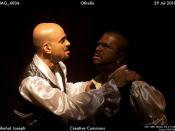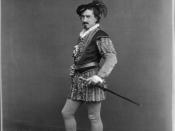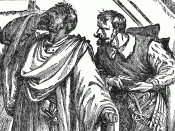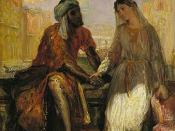Jill Raimonde British Literature 110 10/20/01 Anger in Othello In the Shakespearian play Othello; the most powerful emotion is anger. This emotion helps to establish the lot, as it plays a vital role. Three characters that are affected are Othello, Iago and Roderigo. These three characters vent their anger through violence and confrontations.
Othello's anger is slowly built up during the play, due to Iago falsely convincing him that Cassio and Desdemona are having an affair. It all starts when Othello sees Cassio and Desdemona together. It is then that Iago starts hinting at the possibility of an affair without actually saying it. "O beware, my lord, of jealousy! / It is the green-eyes monster, which doth mock / The meat it feeds on. That cuckold lives in bliss / Who, certain of his fate, loves not his wronger"æ"ÃÂ(3.3.163-166). In this quote, Iago is telling Othello not to be jealous of Desdemona, however in reality, he does want him to be jealous.
The idea of jealously probably wouldn't have entered his mind if it were not for Iago's persuasions. Iago also brings up the idea of Desdemona cheating on him here. He mentions cuckold, which means a man cheated sexually by his wife. Later on, Iago continues to torment Othello about Desdemona and Cassio. "Lie with her? Lie on her? We say lie on her when they / belie her. Lie with her? Zounds, that's fuldome!"æIt is not words that shakes me thus! Pish! / Noses, ears, and lips! Isn't possible? "àConfess? / Handkercheif! O devil"à(4.1.35-36, 41-43). This shows that Othello is becoming completely overwhelmed by his passion and is getting very angry with Cassio and Desdemona. In the end, Othello becomes totally outraged and murders Desdemona by smothering her with a pillow. He also goes on to kill himself. Thus, his anger is vented through violence.
Iago's anger leads to jealousy, which in turn leads to him corrupting Othello's mind for his own personal gain. Iago loved Desdemonia, but Othello and her were already married. This created a problem for Iago, one that the thought he could overcome. He believed that Othello and Desdemonia should not be married and that he she be the one married to her. This also leads him to hate Othello (1.3.376-397). This hatred and anger towards Othello causes him to falsely convince Othello that Cassio and Desdemonia are having an affair. His anger is so strong that he draws in Roderigo to use as his pawn. Iago ordered Rodrigo to draw Cassio into a fight, thus getting Cassio fired. "If I can fasten but one cup upon him, / With that which he hath drunk tonight already. / He'll be as full of quarrel and offence / As my youn mistress' dog. Now my sick fool Roderigo"ÃÂ (2.3.44-47). This shows how he doesn't care what the consequences are to anybody else. He only cares about achieving his own goals. It also shows how he does not hesitate to bring anyone into his plan, even if it means that person's life is at stake. Thus, his anger is vented through non-physical violence.
Roderigo's anger seems to lean more towards Iago than anyone else. In the beginning, Roderigo is upset because he believes that Iago has cheated him. Later, at the end of Act two, he threatens to, "with no money / at all, and a little more wit, return again to Venice"ÃÂ (2.3.357-358). Here, Roderigo is angry about the way he has been beaten, and he threatens to return home. A little bit earlier, Iago had made Roderigo draw Cassio into a fight, so Cassio would get demoted. Roderigo was unaware of the consequences and is angry that Iago did not inform him. In Act four, Roderigo states that he "will no longer endure it. / Nor yet persuaded to put in peace what already / has foolishly suffered"ÃÂ (4.3.177-179). His anger towards Iago keeps building. At the beginning of Act five, Roderigo is overwhelmed with anger and rage that he and Cassio engage in a scuffle and Roderigo ends up wounding Cassio. Thus, his anger is vented through violence.
It is therefore obvious that anger plays a vital role in the play Othello. Without it, there would theoretically be no violence and no story line. This play revolves around anger, which results in violence.
![From the Library of Congress: TITLE: Thos. W. Keene. Othello CALL NUMBER: POS - TH - 1884 .O7, no. 1 (C size) [P&P] REPRODUCTION NUMBER: LC-USZC6-58 (color film copy transparency) RIGHTS INFORMATION: No known restrictions on publication. MEDIUM: 1 print (](https://s.writework.com/uploads/9/94760/library-congress-title-thos-w-keene-othello-call-number-pos-thumb.jpg)




